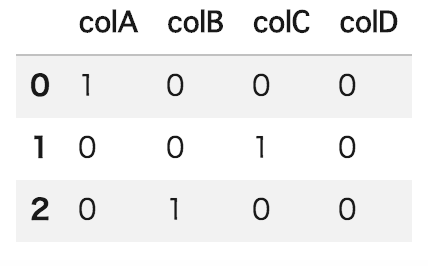
機械学習の学習用データでよく使われるone-hotエンコーディングされたデータがあります。

one-hotエンコーディング処理は、さまざまなライブラリで実装されています。
sklearn.preprocessing.OneHotEncoder — scikit-learn 0.19.1 documentation http://scikit-learn.org/stable/modules/generated/sklearn.preprocessing.OneHotEncoder.html
ただ、one-hotデコーディング、 つまり、もとのデータに戻す処理が見つかりませんでした。

そこで、 以下のようにpandasのデータフレームを使って、one-hotデコーディングする処理を作成してみました。
def onehot_decoder(df): colname_list = [] for index, row in df.iterrows():#各行を取得 for k,v in enumerate(row):#各列の値を取得 if int(v) == 1:#ワンホットになっている列のカラム名を取得 colname_list.append(df.columns[k]) break #デコード済みリストを新規列として追加 df_add = pd.DataFrame(colname_list,columns=['decoded']) return df_add res = onehot_decoder(df_sample)
もう少し簡潔に書けるとは思いますが、わかりやすさのため、このままにしておきます。
前処理方法は、データによって多数のパターンがあり、 scikit-learnのpreprocessingモジュールでさまざまなものが作られています。
API Reference — scikit-learn 0.19.1 documentation http://scikit-learn.org/stable/modules/classes.html#module-sklearn.preprocessing
preprocessing.Binarizer([threshold, copy]) Binarize data (set feature values to 0 or 1) according to a threshold preprocessing.FunctionTransformer([func, …]) Constructs a transformer from an arbitrary callable. preprocessing.Imputer([missing_values, …]) Imputation transformer for completing missing values. preprocessing.KernelCenterer Center a kernel matrix preprocessing.LabelBinarizer([neg_label, …]) Binarize labels in a one-vs-all fashion preprocessing.LabelEncoder Encode labels with value between 0 and n_classes-1. preprocessing.MultiLabelBinarizer([classes, …]) Transform between iterable of iterables and a multilabel format preprocessing.MaxAbsScaler([copy]) Scale each feature by its maximum absolute value. preprocessing.MinMaxScaler([feature_range, copy]) Transforms features by scaling each feature to a given range. preprocessing.Normalizer([norm, copy]) Normalize samples individually to unit norm. preprocessing.OneHotEncoder([n_values, …]) Encode categorical integer features using a one-hot aka one-of-K scheme. preprocessing.PolynomialFeatures([degree, …]) Generate polynomial and interaction features. preprocessing.QuantileTransformer([…]) Transform features using quantiles information. preprocessing.RobustScaler([with_centering, …]) Scale features using statistics that are robust to outliers. preprocessing.StandardScaler([copy, …]) Standardize features by removing the mean and scaling to unit variance preprocessing.add_dummy_feature(X[, value]) Augment dataset with an additional dummy feature. preprocessing.binarize(X[, threshold, copy]) Boolean thresholding of array-like or scipy.sparse matrix preprocessing.label_binarize(y, classes[, …]) Binarize labels in a one-vs-all fashion preprocessing.maxabs_scale(X[, axis, copy]) Scale each feature to the [-1, 1] range without breaking the sparsity. preprocessing.minmax_scale(X[, …]) Transforms features by scaling each feature to a given range. preprocessing.normalize(X[, norm, axis, …]) Scale input vectors individually to unit norm (vector length). preprocessing.quantile_transform(X[, axis, …]) Transform features using quantiles information. preprocessing.robust_scale(X[, axis, …]) Standardize a dataset along any axis preprocessing.scale(X[, axis, with_mean, …]) Standardize a dataset along any axis
上記も後日紹介していきます。